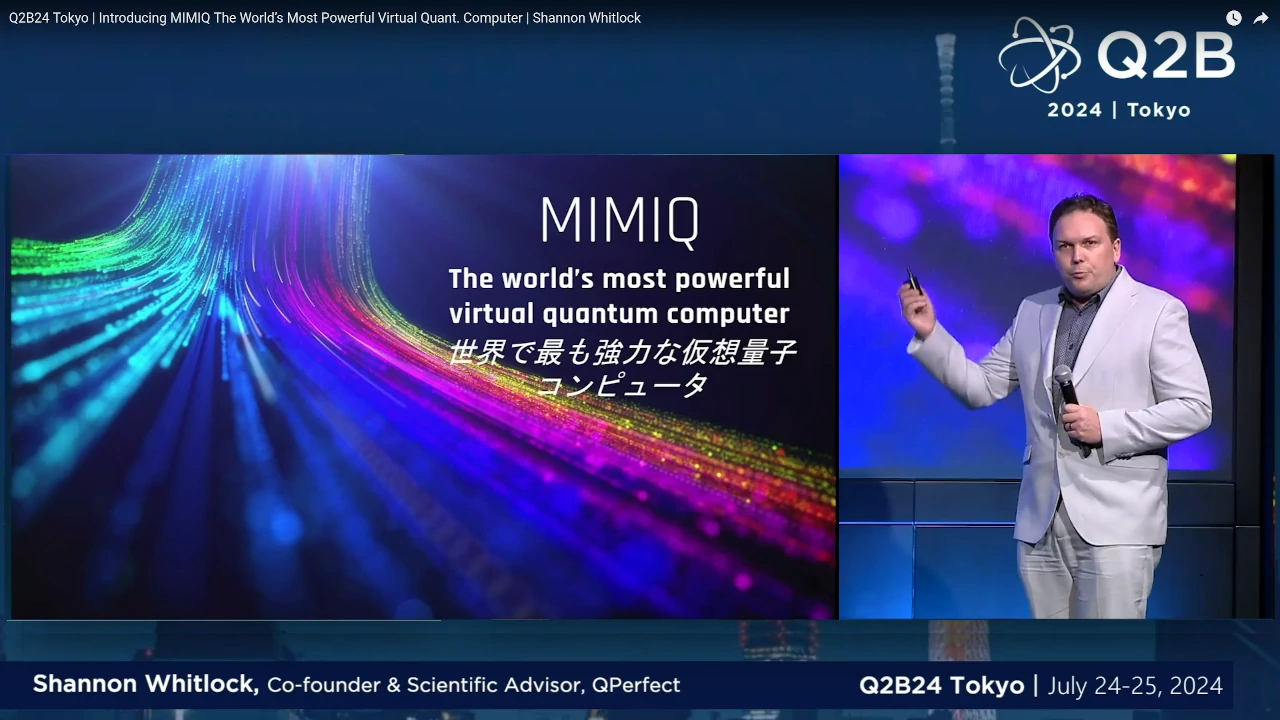10 reasons why you need a better quantum emulator for your R&D

September 2024
Contribution from Shannon Whitlock
Scientific advisor and co-founder of QPerfect.
In July, I attended the Q2B conference in Tokyo where we launched MIMIQ, our groundbreaking cloud-based quantum emulator and virtual quantum computer. I had the pleasure to speak with many participants, both industry leaders and newcomers to the quantum field. What surprised me most was discovering that many were not aware of the true capabilities of quantum emulators, with some expressing doubts about the value they can bring for their research and development efforts.
Digital simulation has become an indispensable tool in nearly every cutting-edge technological field, including aeronautics, materials science, biotechnology, automotive, and computer engineering. Its role is so critical that designing a CPU without the aid of digital simulation tools is practically impossible today. In simulations you have access to, and precise control over, every little detail in a way that can’t be achieved in the real world. It empowers researchers and engineers to test and validate their designs with precision and efficiency, helping to push the boundaries of what is possible. Why should quantum computing be any different?
One reason the quantum industry may not fully appreciate the power of emulation is that simulating quantum computers on classical computers is hard! Traditionally, quantum computer simulation has been constrained to small ‘toy’ problems. For instance, simulating the full quantum state of just 32 qubits pushes the limits of a typical computer, while 40 qubits requires a large cluster, and 50 qubits would need more memory than the world’s largest supercomputer. This is where tensor network emulators like MIMIQ come in. By representing quantum states and quantum circuits as tensor networks instead of statevectors and leveraging advanced compression algorithms, MIMIQ enables the simulation of complex algorithms with thousands of qubits and millions of gates. It delivers unparalleled speed and accuracy, outstripping other emulators and positioning itself years ahead of current state-of-the-art hardware platforms.
Here are 10 reasons why it’s worth investing in a better quantum emulator:
1. Accelerating Hardware Development Cycles
Building quantum computers requires making hundreds of choices regarding e.g. architectural design, error correction strategies, and gate implementations. With quantum emulators you can test multiple solutions lightning fast, anticipate bottlenecks, and thus optimize quantum hardware before or while it is being built. To test and optimize at the relevant scale today requires fast emulators capable of simulating hundreds, if not thousands of qubits. For example, we are using MIMIQ in collaboration with QuEra to develop and test practical quantum error correction codes and logical algorithms involving many logical qubits in the presence of realistic noise, which is extremely hard to do on today’s quantum computers or using other emulators.
2. Accelerating Software Development Cycles
Making quantum computers useful requires finding efficient algorithms that can be executed under realistic noise and with realistic resources. Quantum emulators empower quantum scientists and software developers to stress-test and refine their solutions way ahead of the capabilities of current quantum hardware platforms. This allows us to optimize algorithms, compilers and protocols, in order to mitigate errors and maximize the use of quantum resources such as qubit number, connectivity, or native gates. Of course, this is only possible with universal emulators that can handle realistic noise and system sizes at the scale of useful algorithms.
3. Testing Applications at Scale
A crucial requirement of any useful quantum algorithm is that it should provide a quantum advantage over classical solutions at sufficiently large scales. But how do we prove this? Statevector simulators can solve problems on small scales, e.g., 10-20 qubits, but may lead to wrong conclusions about how your problem behaves on larger scales. Current NISQ devices are either too small or too noisy to extract meaningful conclusions about large scale behavior too. Today, our best tools to break these barriers are advanced emulators such as MIMIQ based on tensor networks, which thanks to efficient compression algorithms can handle 100s of noiseless qubits in complex entangled quantum states. A good tensor-network simulator enables researchers to explore and validate promising algorithms, check the scaling behavior and properly estimate the quantum resources needed for a quantum advantage.
4. Benchmarking and Pinpointing the Threshold to a Quantum Advantage
How can we be sure if a quantum computer is doing what it is supposed to? And how do we know it cannot be done more efficiently using classical methods? Tensor network emulators have become the gold standard for benchmarking quantum computers and testing quantum advantage claims. By allowing researchers to validate quantum computations at the edge of classical computing capabilities it becomes easier to pinpoint problems that are likely to achieve true quantum advantage.
5. Develop New Quantum Algorithms
Programming quantum computers is fundamentally different from classical computers, and deep mathematical insights are hard to come by. Using emulators, you can quickly experiment with different ideas, and potentially discover new quantum algorithms for your use case. With a fast and large-scale emulator, you can also numerically optimize your algorithms over a larger parameter space to boost performance. By developing and testing quantum algorithms on emulators, organizations can stay ahead of the competition and transition to actual quantum hardware as soon as it makes sense.
6. Quantum Inspired Algorithms
There have been amazing advancements in quantum simulation of quantum systems in recent years, and honestly, we don’t know where the limits are just yet. Specialized tensor network methods are already revolutionizing key areas in chemistry, optimization, financial modeling, AI, and life-sciences. Insights gained from the structure of quantum algorithms hold the potential to inspire groundbreaking new advancements. These quantum-inspired algorithms can outperform traditional approaches and could transform many fields far sooner than the widespread availability of fault-tolerant quantum computers.
7. “God Mode” Capabilities
Quantum emulators offer functionalities beyond the reach of quantum computers since they aren’t constrained by “nature”. The most obvious one is that they allow users to switch off noise and errors, providing a clear view of ideal quantum computations. Additionally, emulators can reveal otherwise hidden quantum state properties, such as fidelity, state amplitudes, entanglement measures, and expectation values, offering deeper insights into algorithm performance and bottlenecks beyond what quantum mechanics allows!
8. Cost-Effective Research with No Vendor Lock-In
Quantum emulators are faster, more affordable, more accessible, and more reliable than actual quantum computers. They provide a practical and economical solution for research, enabling broader participation and accelerating the pace of discovery. Moreover, emulators can be easily configured to simulate various hardware platforms and architectures, offering unparalleled versatility. This flexibility allows researchers to explore and compare a wide range of quantum computing scenarios without being constrained by a specific technology.
9. Hybrid Computing
For certain tasks, classical computers are and will presumably remain far better than quantum computers. Therefore, it’s likely that the future of computing will be hybrid, leveraging the best of classical and quantum computing. By bridging both worlds, emulators can help researchers to optimize hybrid algorithms and harness the combined strengths of quantum, AI and HPC.
10. Educational and Training
Quantum emulators are invaluable tools to gain insight into quantum computing algorithms and applications and to develop intuition. Powerful emulators can provide students and new researchers and developers with crucial hands-on experience in the cutting-edge of quantum computing, without requiring access to scarce and expensive quantum hardware.
If you are interested in trying out MIMIQ, visit our product website at https://qperfect.io/index.php/mimiq/ and reach out to us at contact@qperfect.io.
Link to the full Q2B video presenting MIMIQ
Read the MIMIQ press release


